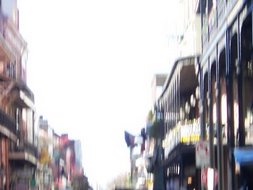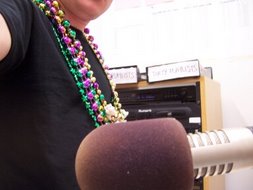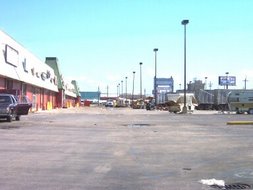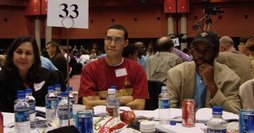
"We should get a picture of the two of us with the two of them."
"That would be COOL!"
So this sweet lady who'd stood on this same sidewalk 2 years ago sidled up to the thief for the second time and asked him if we could all get together. I handed my camera to an elderly woman and showed her how to work the button, and we got together.
And people say the city is plagued by disharmony....

I took the afternoon off and walked home from the office under gathering clouds which mercifully held off until I was safely inside. In my last bit of business-as-usual for the day, I called Cox and had the internet situation straightened out, very effective was I.
My first business of the day was the hand-off of a claim form to a lawyer so that my employer can join a class action suit against the Army Corp of Engineers if things come to that. This involved a semi-frantic lawyer calling to tell me "We're leaving the hotel now," then pulling up outside my office in an SUV with another lawyer, both in shorts and t-shirts, and receiving the form through the driver's window, reviewing it, and telling me that, of course, "who knows where these things end up."
Anyhow, as I waited out the rain at home, I watched a replay of Bush's morning comments. He noted that he hadn't forgotten about us and I found myself yelling, "This is the only time you even mention us, ever!" at his oddly sunburned face. At that point, I knew it was time to go outside and face the elements.
As the barrier is now completely gone, replaced by a slick intersection with a traffic light, I walked towards the river on Melpomene for the first time. Most of the houses on the block are boarded up, victims of which failure, I'm not sure. A small, brick apartment complex sits there dead, though probably a handy hideout for the weaker among us.

I crossed the parking lot of the old Robert store, which replaced the Schwegmann's around the time that the St. Thomas Projects were demolished. In the Schwegmann's days, that parking lot was just about the illest place you could be after dark, even with the store open, the kind of place where you might see two crackheads fight, or find a busted-out old limousine. Three 18-wheeler trailers sit in front of the store now, left behind by somebody.

After walking along Calliope and down Tchoupitoulas, I hit the Convention Center, site of this afternoon's Day of Presence. A white tent and small stage take up about 100 yards of the street. Black people in white hats wipe off rows of black chairs with white rags.
I take a place along the curb, right behind a small platform where a female television reporter receives make up and wiring. Suddenly the sound of a drumline thunders through the carport, but no musicians are visible. Then it cuts, only a recording, and the sunny voice of Blues Traveler fills the air.
We seem to be running late this afternoon, though we're keeping it languid, as usual. Preparations and personnel stroll past--publicist types, a man with a hammer and tool belt, slick types in suits opening and closing cellphones, older ladies in pairs setting up as if for a parade. The television reporter's producer has the typical black rimmed glasses. Kermit Ruffins talks with a couple policemen. I think about Oliver Thomas and how he must have had plans to be here, but all the plans have changed.

A guy walks up to me and silently hands me a white hat, courtesy of the mayor.
How odd to be on this side of the city today, I think. On the one hand, this is the ground zero of governmental collapse, the site of horrors even the President will carry with him into history, the stains of the state's failure. On the other hand, the Convention Center bears no physical evidence of that travesty. We could be at any convention center in the country, with the hotels across the street and the media wearing badges. This is where New Orleans makes money from outside business, so whitewash and amnesia reign.
Through the gathering crowd, a homeless white kid passes by with "House" printed on his blood-stained t-shirt.
The rain starts up again and the few people seated in front of the stage pick up their chairs and move under the carport as a photographer gets a shot of two gentlemen from the Nation of Islam.
And the rain is barely more than a mist, but might go on for awhile, I think. And I think about this anniversary, how instead of a point in time--That Day--the Storm has yet to stop. This event, and all the talk today, is not concerned with the event, but with its continuance. People continue to suffer, the government continues to fail on all levels, and there is no end in sight.
And, after I move to the far end of the crowd opposite the stage, the guy next to me notes that, once again, people are made to stand outside the Convention Center with no access to bathrooms, no food, and no water. As nice as this gesture by the Essence people is, it's a shoddy set-up we have here.
The show begins with an unnamed jazz group playing "So What?" by Miles, a curious choice. Our emcees today are two dj's from two local stations. The male DJ, a tall, skinny guy with braids, starts things off tough, lambasting everyone and reminding us that, in the end, we're responsible for stopping this bullshit. A good, reasonable start, I think. He says we need to keep our goals in my mind when listening to today's speakers: 1. a Marshall Plan; 2. Right of Return; 3. Social Justice.
A reverend from the SCLC offers a prayer as noise gurgles from the "VIP" section. Then the emcee introduces a 7-year old girl who sings Amazing Grace and devastates us. I end up staying for almost 5 hours, but this is the only emotional release of the day.
Of course, you hear children like this almost every year at Jazz Fest in the Gospel Tent, small geniuses with uncanny voices. The difference today is the time and location: the very place that offered forth these children, that populated American culture with their voices, is under such grave threat that even the survival of that genius is in doubt. I listen to that little girl and get chills and am all choked up because there's no telling if, in 20 years, I'll see another like her. That was never in question before the storm.
The speeches continue, with actresses and lawyers and union organizers all demanding our just desserts. Again and again, we hear about the raw deal we've recieved from the federal government, with no mention of the city administration or the police, or even much mention of crime. Worse, there's very little said about what actually happened on this street outside the Convention Center two years ago. We don't read off the names of the dead or mark the time with memories of terrible events. Instead, speaker after speaker demands justice, which is all fine and good, but can't we mourn? Can't we relive what happened and relate and curse the criminals who stranded the poor and sailed past this spot without stopping? Everyday in this city, people deal with the set-up and the malfunctions of the recovery. Today, though, I thought we'd look back for a moment.
Seeing Nagin begin his approach to the stage, I slide into the VIP section and look around. People continue to backslap and converse, even as the emcee lectures them about showing respect to the speakers and not acting like Very Important People. Nagin mounts the stage stairs and I move over to get closer to the front.
Nagin is greeted by applause, but nothing extraordinary, and he begins his speech with his stock joke: "I've been known to get into some controversy," and then pauses for laughter, none coming. It's truly incredible what a warped sense of self he possesses, and theorizing about his internal logic is impossible.
I know someone who worked in his office. This person did a bunch of work to get grants to start a program for the homeless, a hot topic recently. When it was time for Nagin to sign off on the program, the mayor informed this person that he wanted to use money from another pool. "But why, this money is there, you just need to sign here, and besides, you can't use that other money, it's allocated." Nagin's response? "Make it happen." Program died.
After describing his conversations with Bush earlier in the day, Nagin notes that maybe it's time for a new president.
"Watch," I say to the woman next to me. "He's gonna say he's running for president."
"Pfft, I'd like to see that," she says.
No, Nagin has another idea.
"I think maybe we should call up Colin Powell."
Huh. Well, I guess...yeah, Colin Pow--wait, what? I'll take a stab: we're at an event sponsored by an African American magazine and attended by mostly African-Americans, so maybe Ray thought this new balloon was worth a float? Colin Powell, that's what this city needs, according to the mayor.
I start talking to the woman next to me. She's probably in her late 30's, African-American, was at the Convention Center 2 years ago.
"People don't just get over something like that. I mean, what we saw...a woman killed herself in front of her children...What do you tell your children?"
We talk about how shameful it is that no one's mentioning the people who died, or what happened on this very ground, how we wore black because we wanted to mourn. She says she and her kids are about to be evicted from the Marriot, where they've been staying. So every time a politician nears, she's going to tell them she needs help or they're on the street by Friday.
"What do you think's going to happen?" I ask. She shakes her head.
"I'm going to walk into City Hall."
LISTEN: HER NAME IS DIMETRA BOYKINS. IF ANYONE CAN HELP HER, CALL 504-758-6740.

Nagin is so damn uncomfortable, you'd think this woman was asking him to move into his house, or that she was a degenerate, instead of the obviously stressed out but intelligent person and CITIZEN that she is. He winces so hard, his skull looks like it might burst through his sagging, sallow skin. When she returns, I ask what he said.
"He said this," she says, showing me the business card of the mayor's PR guy. She holds the card over her head. "We can't live under this, I don't think."
We continue to keep on a eye on Nagin as Congressman William Jefferson slinks through the crowd and onto the stage. His daughter the state rep precedes him at the lectern with the hurried speech of a valedictorian who barely knows her classmates. Clearly the machine is battered.
Jefferson's manner is a cross between Jimmy Carter and a flasher. He tries to give us a lesson in math, the point being that the $117 billion the federal government didn't make it to New Orleans. It comes off like a junky snake oil salesman. He says the feds cheated us.
I tell Dimetra that Jefferson has a lot of nerve talking about cheaters, and that perhaps, as our representative for 20 some years, he might've asked about the levees before it was too late.

As Jefferson descends into the crowd, we note how he keeps his distance from Nagin. When the representative and his wife get closer, Dimetra says, "Oh, he doesn't want to cross my path either."
"Go ahead and talk to him," I say when Jefferson is at arm's length.
Now, Jefferson is a lot slicker a pol than Nagin, throwing his arm around Dimetra and getting close. He listens as she explains that she's on the verge of homelessness, then tells her he get his associate to get her info. At that point, I suggest the photo and we all huddle up.
After the picture, I don't say anything to Jefferson or wife Betty. We all stand there, waiting for an associate, and soon Jefferson is alone, no one talking to him, no one waving or greeting him. His blue back is turned to me, though he keeps peeking over his shoulder, and I give him the thousand yard stare. I can't say much, cause I don't want to fuck things up for Dimetra. So the man who once controlled politics in this city has to slump nervously and wait for some attention.
He is not the only one pathetic. We are all in a pathetic shape with him in our midst, the gagged voice in the House, a walking corpse who casts his odor over our hopes yet will not go away. Finally the adviser returns and speaks to Dimetra, tells her to catch him before Jefferson leaves.
After slinking around in similar, lonely fashion, ex-mayor Marc Morial takes to the stage. If things continue on the pace of the last year, Morial, too, will be indicted for various corruptions. The circle tightens around him with each former associate who cops a plea. For now, he's the head of the Urban League and one of the city's most famous sons. Dressed in a strange mock turtle neck, and with a decidedly NO Museum of Art manner, he tries to rekindle the romance by appealing to our love of neighborhoods.
At some point I realize that Dimetra is gone, perhaps off to catch another political adviser. Just as she did two years ago, she's fighting to stay alive outside the Convention Center. And with no mention of their names or suffering, the ghosts of those who died there mingle among us, only slightly more invisible to the VIP's than Dimetra herself.
I slip away, through the vacant streets of the Warehouse District, home to many a spiffy loft and boxy bar and grilles. I don't know where I'm going, I don't know where Dimetra went, I don't know what comes of speech-making, or what to do with grief. Through all the handshaking and applause, I saw no one weep for the dead, never heard them named.
Yes, I believe we need a Marhsall Plan, the right of return, all of that. But with the same old, grotesque bagmen allowed to make claims on behalf of people who still have to stand outside the Convention Center, I wonder what the fuck will come of surviving.
And I wonder why those who did not survive are lost in the shuffle, ignored in death as they were in life, even by those who claimed to care for them.











